Education
Language learning is in ‘steep decline’

A REPORT this week has highlighted an alarming decline with Welsh Schools’ provision of Modern Foreign Languages (MFL). In a hasty response, Education Minister, Huw Lewis, announced new plans to improve and promote MFL across Wales’ schools.
The report, published by the British Council and CFBT Education Trust, which was carried out across two thirds of Welsh secondary schools, showed a drop of over 4,000 pupils since 2002 taking either a German or French GCSE.
At the same time as Wales reached near crisis levels for MFL uptake, England and Scotland, unlike the Welsh government, put in policies to increase provision. As a consequence, uptake in French increased in England by some 19% between 2012 and 2013.
As England has introduced a compulsory MFL curriculum at primary level, Wales has not. Even where MFL is compulsory, in the first 3 years of secondary school, the report showed that only a minimal or fragmented experience of language learning was being received by pupils.
Earlier this year a Welsh Government spokesperson was quoted as saying: “Learning a modern foreign language is not compulsory in primary schools in Wales”, but continued by opining that, “it should be noted that all children in primary schools in Wales are taught Welsh”.
Reacting to criticism and alarming statistics, Huw Lewis has launched, this week, ‘Global Futures’, a plan, he said, to improve and promote MFL in Wales that will come into effect from September and will be supported by up to £480,000 of Welsh Government funding in the first academic year.
The minister went on to say that under the plan, one secondary school in each of Wales’ four regional consortia will be appointed as a Centre of Excellence for MFL. Teachers at the appointed Centre for Excellence will receive targeted Continuing Professional Development and benefit from new partnership arrangements with language institutes and Welsh universities to help them develop high level language teaching skills.
They will then be tasked with working in partnership with other secondary schools and primary schools in their area to drive up teaching standards for MFL across the region. An MFL steering group, he said, that was made up of experts from schools, universities, Estyn, British Council, language institutes and education consortia will also be established to ensure the plan is fully implemented.
Mr Lewis said: “Linguistic skills are rapidly becoming one of the most important skills a young person can acquire to compete for jobs in the global economy. They are important to Welsh businesses too as increasing amounts of our trade and commerce is done with new partners overseas.
“I want to ensure that more and more of our young people actively choose to study a Modern Foreign Language as part of their school education, and develop the skills they need to thrive in a modern global economy. We need a radical and new approach.”
Owen Hathway, NUT Wales Policy Officer, said: “As with any ‘outreach’ initiative it is wholly vital that this is seen as working with schools rather than simply monitoring and challenging them. Regional consortia bodies have failed to find the correct balance in the past.”
However, Dr Philip Dixon, Director of ATL Cymru, said: “This announcement is far too late and far too little to stem the catastrophic decline in the teaching of modern foreign languages. That decline has been apparent for over a decade. We must wonder if the Welsh Government is serious about this matter at all. Changes to the way schools’ performance is measured, to be introduced in the next year or so, will simply make things worse. We fear it is a case of ‘adios’ to foreign languages.”
Also commenting on the news that the Welsh Labour Government is to overhaul its strategy on MFL was Angela Burns AM, Shadow Minister for Education, who said: “Labour took measures which actively discouraged modern foreign language study, slashed funding for the National Centre for Languages and failed to capitalise on a successful pilot of foreign language study in primary schools.
“The ability to communicate in multiple languages is an increasingly valuable skill in the international jobs market, but unfortunately if young people lack the skills employers seek, Wales will fall further behind in the global race.
“Language learning is crucial to the future of the Welsh economy and can help ensure that Wales doesn’t become isolated with school leavers and graduates only able to communicate in their mother tongue.”
Asked if it might be the case that Welsh language teaching had replaced MFL provision, a Pembrokeshire County Council Spokesperson said: “MFL and Welsh are not treated similarly due to the statutory requirement to teach Welsh second language in primary schools and up to the age of 16 in secondary schools. MFL teaching is only required to be taught from Years 7-9 (ages 11-14). The statutory nature of Welsh second language is a curriculum priority set by the Welsh Government.”
Education
Research reveals nearly half of children in Wales had additional learning needs

A NEW study has highlighted the prevalence of additional learning needs, formerly known as special educational needs, among under 16-year-olds in Wales. The findings come with a policy briefing, calling for a robust review of processes used to recognise such issues and more inclusive learning support for all children nationally.
The research and policy reports, led by the University of Bristol and funded by the Nuffield Foundation, found nearly half (47.9%) of children born in 2002/2003 were identified with some form of additional learning needs (ALN) at some point during their schooling. This was shown to have the biggest impact on academic achievement across all Key Stages of their education.
Lead author Dr Cathryn Knight, Senior Lecturer in Psychology of Education at the University of Bristol, said: “Our findings clearly challenge the notion that learning needs only affect a minority of learners. Key common factors increasing the likelihood of being identified with SEN also emerged, emphasising the importance of recognising the child’s environment and understanding their individual situation to effectively support their learning needs.”
Researchers from the University’s School of Education and Swansea University analysed data from more than 200,000 children in Wales, born between 2002 and 2009, to understand the levels of SEN and its impact on academic achievement.
Findings revealed that the earlier the additional needs emerged and were recognised, and the longer their education was spent with these known needs, the less likely they were to meet nationally expected levels of attainment.
Dr Knight said: “Our research suggests the former SEN system in Wales was unable to effectively support students to mitigate the negative impact of SEN on their grades. This underscores the substantial toll of SEN on academic achievement. To improve academic attainment levels in Wales, it is crucial to prioritise effective support for this very large group of learners.”
Learners having free school meals (FSM) throughout their education were found to be four times more likely to be identified with SEN compared to those not in receipt of free meals. Those born in the most deprived neighbourhoods were shown to be even more likely (4.6 times) to be identified with SEN.
The study also showed boys were much (5.5 times) more likely to be identified with SEN than girls. Children with higher school attendance had a lower likelihood of SEN identification and learners born in the summer, so younger in their year group, were three times more likely to be identified with SEN than those born in the autumn.
Dr Knight said: “This raises concerns about the effectiveness of SEN identification processes, particularly given the unexpectedly high number of learners identified with SEN. It suggests a potential issue of over- or under-identification of certain children.”
The main policy recommendations in the report were to prioritise inclusive educational initiatives that recognise and support all children. The substantial impact of SEN on children’s grades, raises questions about how children with learning needs can be supported to show progression within the education system. Therefore, consideration of more inclusive assessment practices is recommended. The report also calls for current methods used to identify learning need to be rigorously reviewed, with a new focus on ensuring accuracy, fairness, and inclusivity.
The research mirrors similar national findings. Evidence from the Education Policy Institute in England also found a high level (40.7%) of SEND (Special Educational Needs and Disability) identification. Other research, published in the British Educational Research Journal, has also shown that children with SEND in England are also far less likely to meet expected learning standards than their peers at Key Stage 1.
Dr Knight said: “We also need longer-term evidence within Wales and across the UK in order to develop a fuller understanding of the challenges. This includes possible systematic issues with how learning needs are recognised and their subsequent impact on attainment.”
Education
School children focus on Pembrokeshire’s renewable energy future
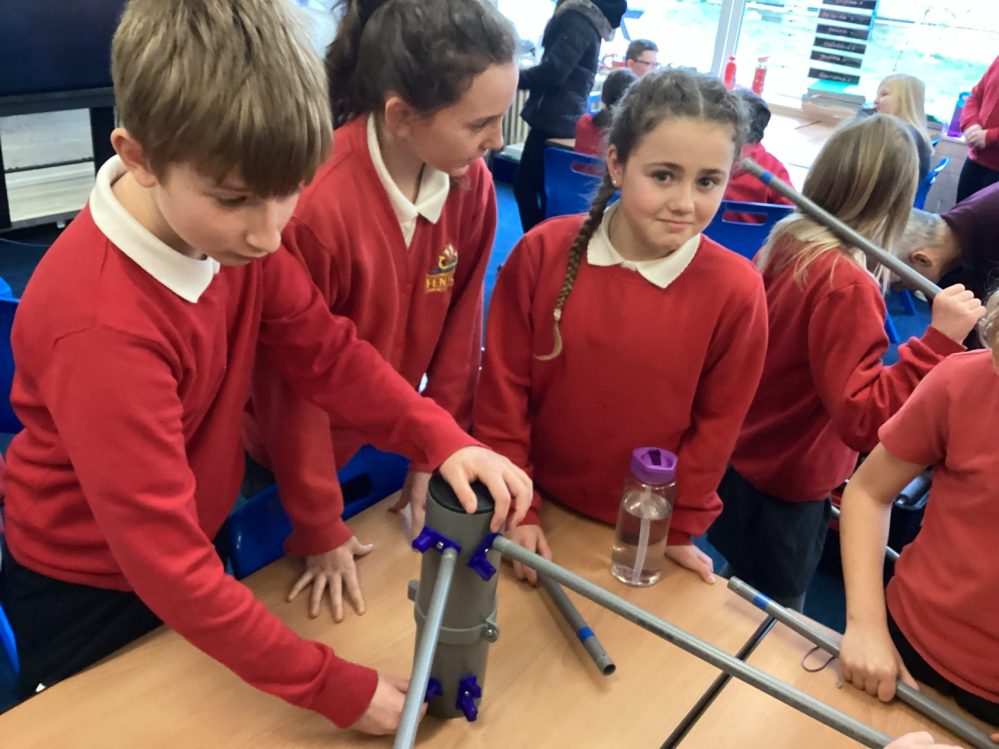
FENTON COMMUNITY PRIMARY SCHOOL welcomed renewable energy experts to help Year 5 and 6 learners broaden their knowledge as part of their Marine Energy Project.
During the summer term Blue Gem Wind, Pembrokeshire Coastal Forum and the Darwin Experience have discussed Pembrokeshire’s importance in the renewable energy sector and low carbon technologies with the school children.
Learners designed and built models of different anchorage structures for offshore turbines, and learnt from the Darwin Centre about the different marine organisms that might colonise them.
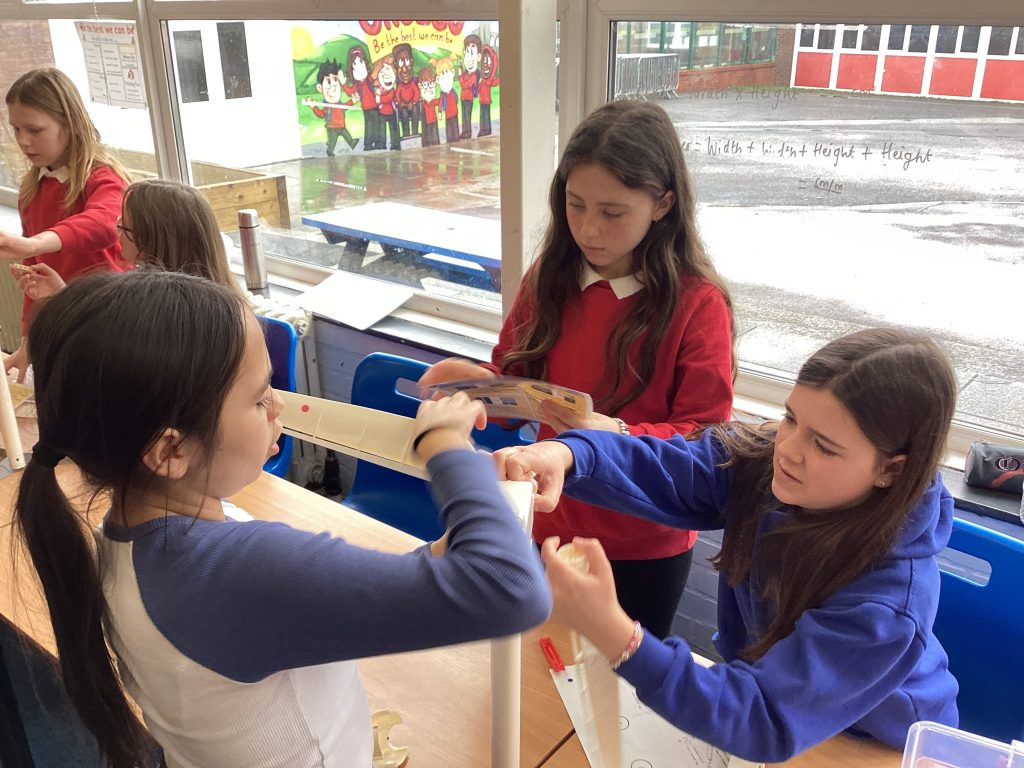
They pitched their design ideas, with a combination of class designs being built and deployed at the Marine Energy Test Area (META) in Milford Haven by Pembrokeshire Coastal Forum.
The visits have inspired many new ideas and possibilities for the future of the learners.
Summer Marshall (Year 6) explained: “It was a great opportunity for our designs to be actually made into something for a real-life purpose.”
“If it wasn’t for this project I wouldn’t have learned about the importance of marine habitats and how these are linked to our future,” added TJ Hill (Year 6)
“It is really important because a lot of future jobs will be based around renewable energy and technology,” said Milly Badger (Year 6).
“From having Blue Gem Wind, META and Darwin visit, it’s made me think about a job in renewable energy,” added Oscar Davies (Year 6).
Acting Executive Headteacher Gareth Thomas said: “The project has enabled development of careers and work-related experiences with our learners. Direct industry engagement has been crucial to motivate our learners to think about the future jobs in Pembrokeshire and the life they may lead here.”
Year 5 and 6 teachers Leah Hackett, Matthew Vaughan and Mike Lowde agreed that many of their pupils could work in the renewable industry in future.
“Hopefully, after this, we have a group of enthusiastic pupils who already have a keen understanding of the benefits of renewable energy and the place it holds in Pembrokeshire and the wider world,” they added.
Education
Pupils delight in ice cream treat from Pembrokeshire’s number one van

CHILDREN at Ysgol Caer Elen in Haverfordwest were treated to a delightful surprise on Tuesday when they were all given the opportunity to enjoy ice cream, generously provided by Mr McGeown and his family.
The delicious ice cream, a highlight of the school’s summer celebrations, was not just a treat for the pupils but also a testament to the McGeown family’s commitment to supporting educational projects. The funds raised by the family have been donated to the school, aimed at enhancing various school initiatives.
The joyous event was made even more special by the efforts of volunteers Martin, Sian, Amirah, Jack, and Alyannah, who served the ice cream. Their contribution ensured that the occasion was filled with a wonderful and happy atmosphere.

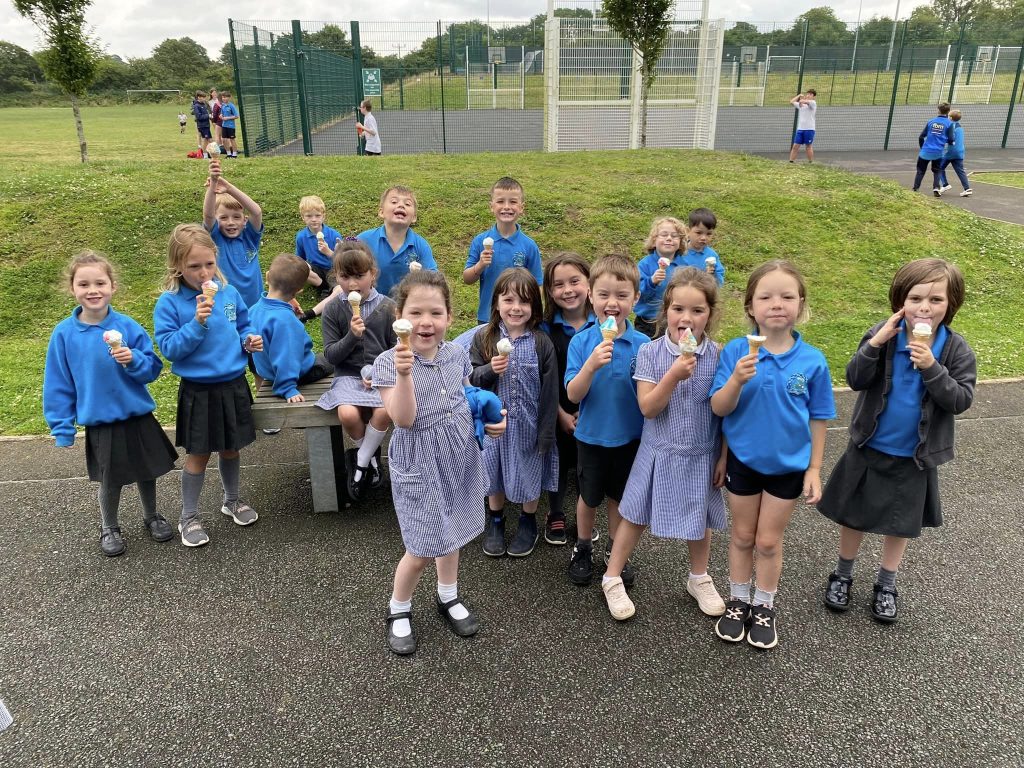
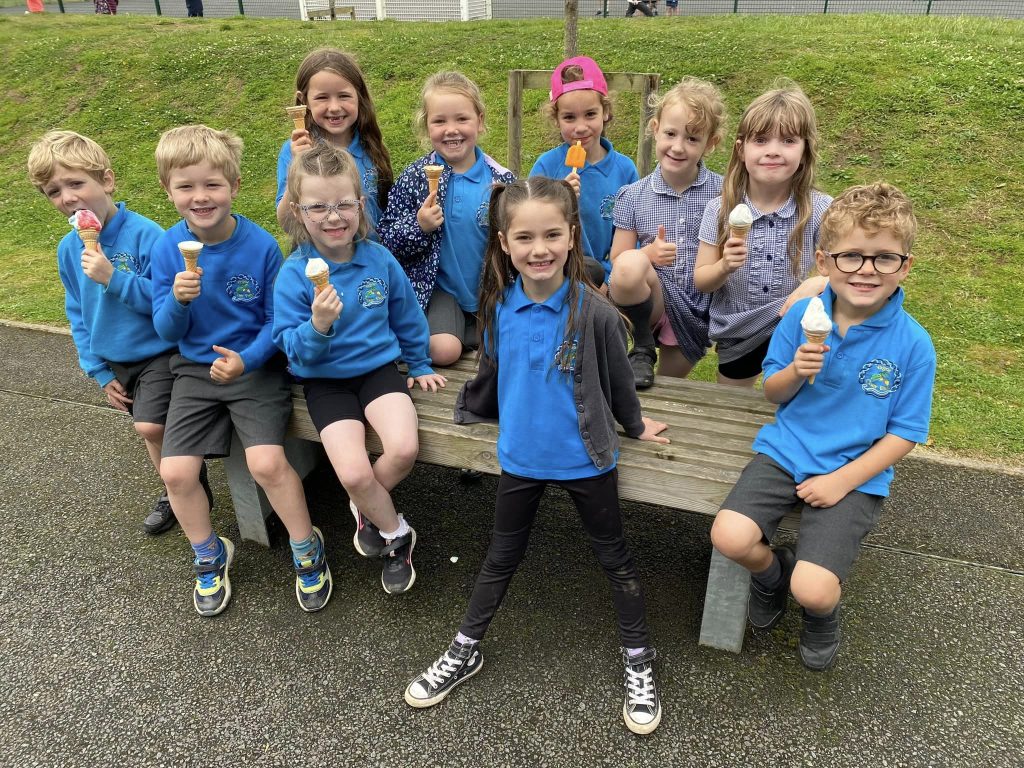



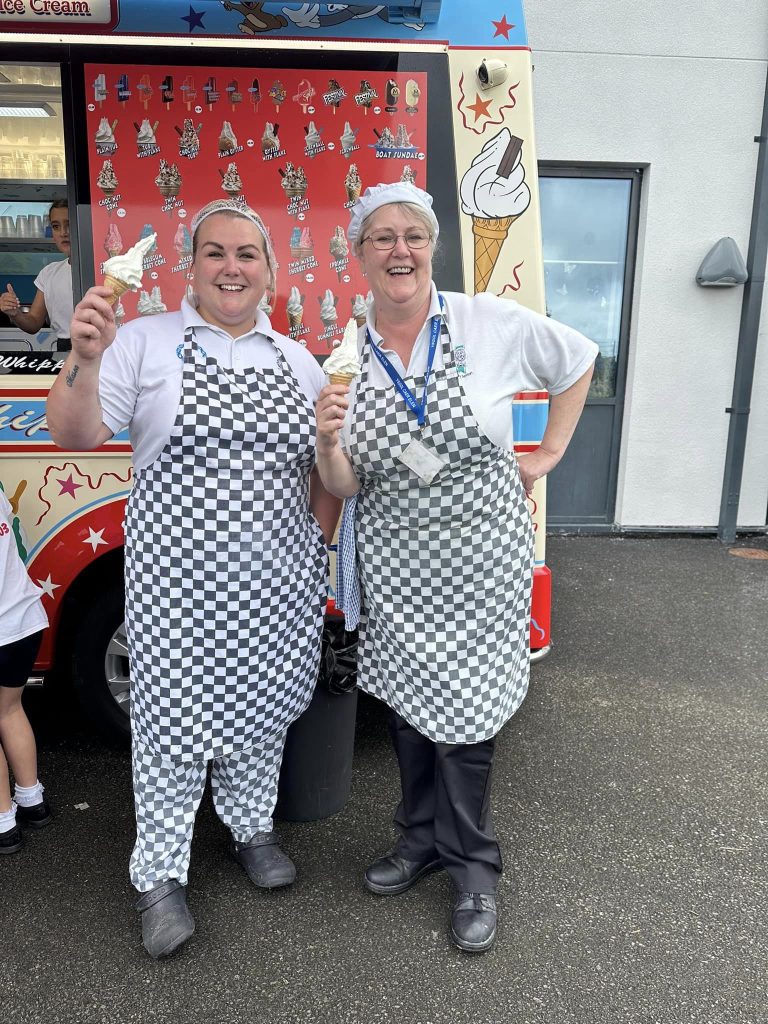

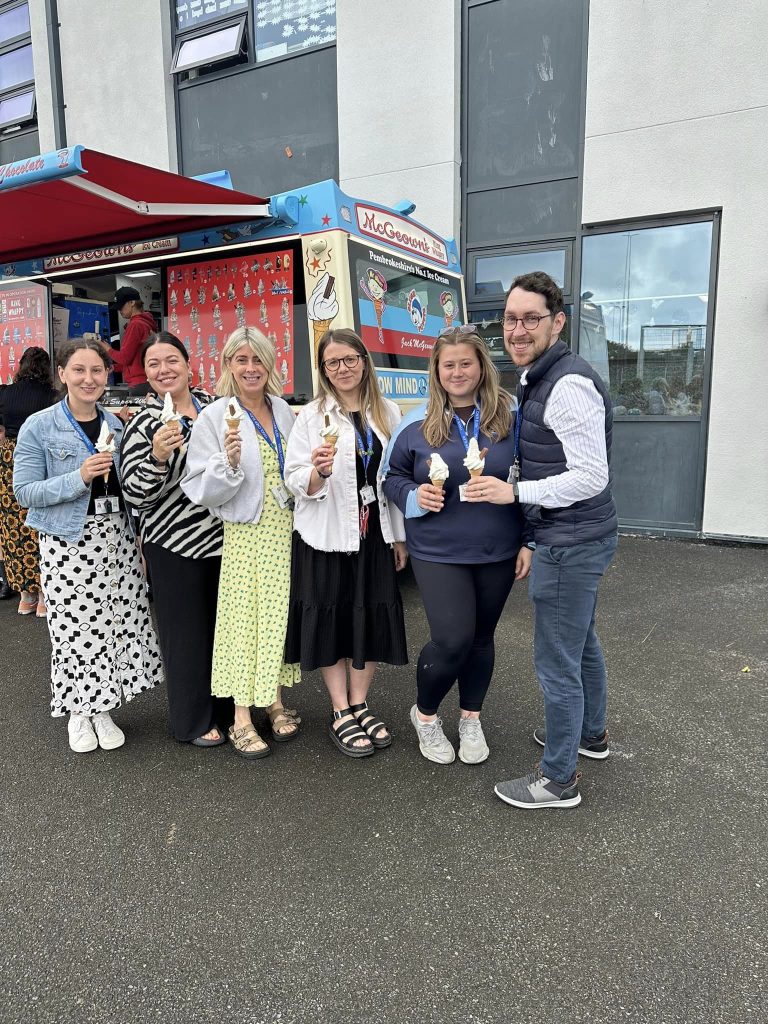



The school extends its heartfelt thanks to Mr McGeown and his family for their generosity and support. Their donation will play a crucial role in the continued development and success of school projects, benefiting all pupils.
“We are incredibly grateful to Mr McGeown and his family for their kindness and support,” said Mr Dafydd Hughes, the headteacher of Ysgol Caer Elen. “The ice cream treat brought immense joy to the children and added to the spirit of our summer celebrations.”
Ysgol Caer Elen, a pioneering Welsh-medium school catering to students from ages 3 to 16, prides itself on its vibrant community and commitment to high-quality education in Pembrokeshire. The school’s ethos centres on creating a caring and inclusive environment where every pupil is encouraged to achieve their best and develop their skills for the 21st century
The community looks forward to seeing the positive impact of the McGeown family’s contribution, as the school continues to thrive with the support of dedicated and caring individuals.
-

 Education5 days ago
Education5 days agoMilford Tesco worker achieves Oxford dream and lands top legal job
-

 Crime4 days ago
Crime4 days agoHaverfordwest man admits having nearly 1000 child and animal images
-

 Crime4 days ago
Crime4 days agoYouth set to appear in court over serious sexual offences
-

 Crime4 days ago
Crime4 days agoPolice investigating after man injured during altercation in cemetery
-

 Education4 days ago
Education4 days agoPupils delight in ice cream treat from Pembrokeshire’s number one van
-

 Crime4 days ago
Crime4 days agoTown centre ‘stinking of skunk’ as police strip cannabis farm
-

 Crime3 days ago
Crime3 days agoFag-butt police court summonses spark debate in Pembrokeshire
-

 News6 days ago
News6 days agoProposal to give firefighters a council tax discount to go to Cabinet






























